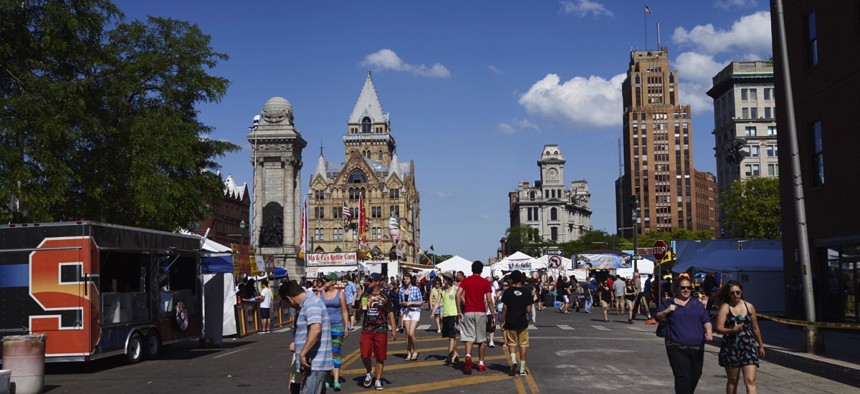Syracuse Wants Citizens to Help Boost Street Quality Using Open Data

Syracuse, New York
“It’s a way of bringing new resources and new ideas to a very traditional problem,” said Mayor Stephanie Miner.
The city of Syracuse, New York is turning to tech savvy citizens as it seeks new ways to improve local street conditions.
A “civic data hackathon” dubbed the Syracuse Roads Challenge began there last Monday. Participants were provided with data about Syracuse’s streets. Their challenge is to use that information to develop tools and analyses that can help the city up the quality of its roads.
“It’s a way of bringing new resources and new ideas to a very traditional problem,” Mayor Stephanie Miner said by phone earlier this week.
Miner pointed out that much of Syracuse’s infrastructure is getting on in years and is also bedeviled by upstate New York’s often harsh winter weather. “It’s old and it’s cold and our infrastructure has been breaking down faster than it has been before,” the mayor said.
“While I advocate for more resources from the federal government and the state government,” Miner added, “we have to do something ourselves to address this problem proactively.” She highlighted a number of ways the city has been using data and sensor technology on this front.
But, in her view, the hackathon is not only a way to get fresh ideas about how to improve infrastructure. It’s also a way to “make people feel like they have a role in their government.”
“Part of me is just excited about the idea that you have other people thinking about this,” Miner said.
Hackathon submissions are due this Sunday. The event is a competition, and whoever’s behind the winning project will net $2,500. Second and third place projects will get cash prizes as well. AT&T sponsored the purse. The top projects will be announced publicly the week of Oct. 17.
A spokesman for Miner’s office, Alexander Marion, said in an email Tuesday that the hackathon isn’t costing Syracuse anything other than staff time.
He also said it wasn’t clear yet how many participants would compete in the event.
Datasets the city has provided for the hackathon include a “shapefile” for Syracuse’s street network, data on most of the potholes filled there since April and road quality ratings dating back to the year 2000. Also available to participants are datasets from Onondaga County, New York state, the U.S. federal government and other sources.
Along with the city and AT&T, Syracuse University’s School of Information Studies is supporting the hackathon. The school helped lay groundwork for the event and has also promoted it to students and in classes, according to Marion.
Earlier this year, Syracuse deployed newly developed sensor technology to gather and map data on rough pavement and potholes in the city. But that information was not released for the hackathon. Marion said it is still being analyzed.
Previously on Route Fifty: Here’s How Syracuse Plans to Gather Data on All of Its Potholes and Rough Roads






